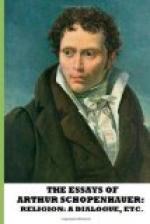As a matter of fact, it is only to monotheism that intolerance is essential; an only god is by his nature a jealous god, who can allow no other god to exist. Polytheistic gods, on the other hand, are naturally tolerant; they live and let live; their own colleagues are the chief objects of their sufferance, as being gods of the same religion. This toleration is afterwards extended to foreign gods, who are, accordingly, hospitably received, and later on admitted, in some cases, to an equality of rights; the chief example of which is shown by the fact, that the Romans willingly admitted and venerated Phrygian, Egyptian and other gods. Hence it is that monotheistic religions alone furnish the spectacle of religious wars, religious persecutions, heretical tribunals, that breaking of idols and destruction of images of the gods, that razing of Indian temples, and Egyptian colossi, which had looked on the sun three thousand years, just because a jealous god had said, Thou shalt make no graven image.
But to return to the chief point. You are certainly right in insisting on the strong metaphysical needs of mankind; but religion appears to me to be not so much a satisfaction as an abuse of those needs. At any rate we have seen that in regard to the furtherance of morality, its utility is, for the most part, problematical, its disadvantages, and especially the atrocities which have followed in its train, are patent to the light of day. Of course it is quite a different matter if we consider the utility of religion as a prop of thrones; for where these are held “by the grace of God,” throne and altar are intimately associated; and every wise prince who loves his throne and his family will appear at the head of his people as an exemplar of true religion. Even Machiavelli, in the eighteenth chapter of his book, most earnestly recommended religion to princes. Beyond this, one may say that revealed religions stand to philosophy exactly in the relation of “sovereigns by the grace of God,” to “the sovereignty of the people”; so that the two former terms of the parallel are in natural alliance.
Demopheles. Oh, don’t take that tone! You’re going hand in hand with ochlocracy and anarchy, the arch enemy of all legislative order, all civilization and all humanity.
Philalethes. You are right. It was only a sophism of mine, what the fencing master calls a feint. I retract it. But see how disputing sometimes makes an honest man unjust and malicious. Let us stop.
Demopheles. I can’t help regretting that, after all the trouble I’ve taken, I haven’t altered your disposition in regard to religion. On the other hand, I can assure you that everything you have said hasn’t shaken my conviction of its high value and necessity.
Philalethes. I fully believe you; for, as we may read in Hudibras—
A man convinced against his will
Is of the same opinion still.




